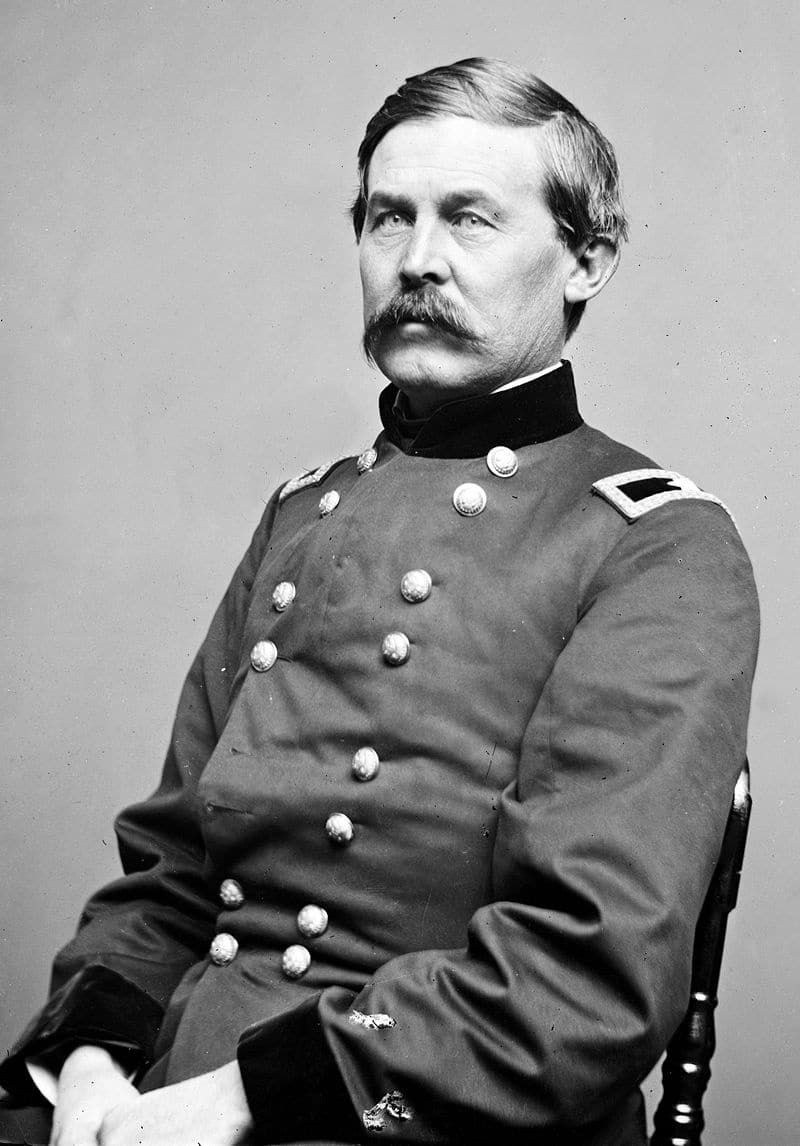General John Buford was a United States cavalry officer who is best known for his role in the Battle of Gettysburg.

He was a West Point graduate and remained loyal to the Union despite being born in the border state of Kentucky. He saw much action during the Civil War but died from typhoid fever at the age of 37. Just before his death, he received a message from President Abraham Lincoln promoting him to Major General.
Jump to:
General John Buford: Early Life
- General John Buford was born in Woodford County, Kentucky.
- Despite being born in Kentucky, his father became a prominent Democrat for the state of Illinois and one of Abraham Lincoln's political rivals.
- Buford's ancestry ran deep in America. His grandfather and great-uncle served in the American Revolutionary War.
- He graduated as the class of 1848 at West Point. Many of the men he graduated with he would fight with and against during the Civil War.
- After graduation, he was commissioned a brevet second lieutenant in the 1st U.S. Dragoons and then transferred to the 2nd U.S. Dragoons.
- He would go on to participate in the Utah War and on peacekeeping duty in Bleeding Kansas.
General John Buford: The Civil War
- Buford learned of secession when the Pony Express delivered word that Fort Sumter had been fired upon. He had to make a choice where his allegiance would lie, and he chose the North.
- In November 1861, he was appointed as Assistant Inspector General with the rank of major. After several months, he was promoted to brigadier general of volunteers.
- In 1862, he was given a position under General John Pope as commander of the II Corps Cavalry Brigade of the Union Army of Virginia.
- He saw action in the Second Battle of Bull Run and was wounded.
- He returned as chief of cavalry and served under Major Generals George McClellan and Ambrose Burnside.
- He did not receive an actual field command until Major General Joseph Hooker gave him the Reserve Brigade of regular cavalry in the 1st Division.
- In the Gettysburg Campaign, Buford, who had been promoted to command of the 1st Division, is credited with selecting the field of battle at Gettysburg.
- His skillful defensive troop dispositions, coupled with the bravery and tenacity of his dismounted men, allowed the I Corps, under Major General John F. Reynolds, time to come up in support and thus maintain a Union foothold in tactically important positions.
- In the Retreat from Gettysburg, Buford pursued the Confederates to Warrenton, Virginia, and was afterward engaged in many operations in central Virginia, rendering particularly valuable service in covering Major General George Meade's retrograde movement in the October 1863 Bristoe Campaign.
- Before he was deposed from the field, he had served in the following engagements:
- Second Battle of Bull Run
- Battle of South Mountain
- Battle of Brandy Station
- Battle of Upperville
- Battle of Gettysburg
- Battle of Boonsboro
- Battle of Funkstown
- Battle of Williamsport
- Bristoe Campaign
General John Buford: Death
- By mid-December, General Buford was struggling with Typhoid Fever, and he became bedridden and delirious.
- In the last hours, Buford was attended by his aide, Captain Myles Keogh, and by Edward, his black servant. Also present were Lieutenant Colonel A. J. Alexander and General Stoneman. His wife Pattie was traveling from Rock Island, Illinois, but would not arrive in time. Near the end, he became delirious and began admonishing the servant, but then, in a moment of clarity, called for the man and apologized: "Edward, I hear that I have been scolding you. I did not know what I was doing. You have been a faithful servant, Edward."
- John Buford died at 2 p.m., December 16, 1863, while Myles Keogh held him in his arms. His final reported words were, "Put guards on all the roads, and don't let the men run to the rear."
- His funeral service was attended by President Lincoln and many of his peers.
